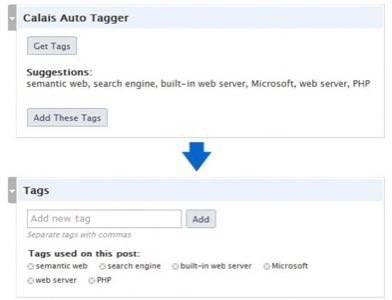Open Calais, a semantic markup API from Reuters that we’ve written about on ReadWriteWeb before, has finally gotten the WordPress plugin it has been looking for since January, when it started a bounty program seeking one. The new plugins come from developer Dan Grossman and represent one of the first public-facing applications of the API (as opposed to private uses like that of the Powerhouse Museum).

As we reported in March, even with a $5000 bounty, Calais didn’t receive much of a response. “Unfortunately – and unexpectedly – we haven’t seen any reasonable applications for the bounty process so we’ll most likely be contracting for the development of the WordPress plugin,” wrote Reuters’ Tom Tague at the time. We speculated then that the relatively small size of the bounty may have been the issue. However, Grossman’s plugins took just “a few hours” to complete, and though they don’t technically meet all of the bounty requirements (they don’t do tag clouds or have GUIDs om the RSS items), Grossman estimates that “it’d take only a few hours more to have met all the bounty conditions.”

Grossman’s plugins, which are available as an auto tagger and an archive tagger (to go back and tag old posts), received over 500 downloads in the first two days. The plugins work by sending post text to Calais and retrieving a list of suggested tags. The plugins rely on an Open Calais PHP class, also written by Grossman. Eventually, the plugins will be released under a Creative Commons license. Grossman tells us he’s waiting until the next Calais feature update, scheduled for May 1st, before adding any more features to his plugins.
As we’ve noted, because of Calais’ roots as Clearforest the rules it applies while parsing text are biased toward the language of business. That means that business or tech bloggers will likely find more utility in Calais for the time being. If you’re writing about Fortune 500 companies, the Calais WordPress Auto Tagger plugin might be very useful, but if you routinely write about sewing teddy bears, though, its usefulness might be dubious.
Unfortunately for Grossman, the application deadline for the $5000 bounty passed in March and Reuters has since farmed out the work of creating a WordPress plugin to a commercial firm. Though work on that plugin continues, we’re told that people at Calais have expressed interested in working with Grossman on future Calais-related projects. Open Calais is one of the most interesting new semantic APIs, and we’re keen to see developers finally start to embrace it and make some useful mashups.

















